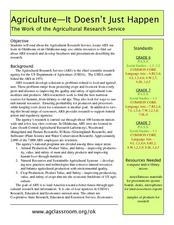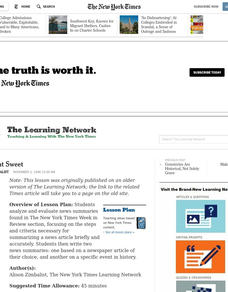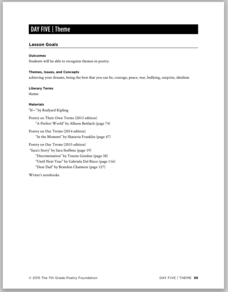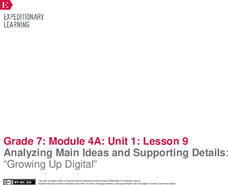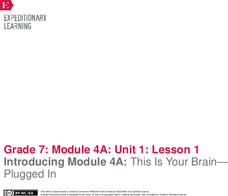Institute of Electrical and Electronics Engineers
Nano Waterproofing
This lesson will make an impact, especially on scientist-athletes who may have an interest in waterproof clothing! Acting as materials engineers, they work collaboratively on waterproofing pieces of cotton fabric. This challenge is...
Institute of Electrical and Electronics Engineers
Telescoping Periscope
Ahoy, matey! Here is an engineering expedition that mini mariners are sure to be swept away by! After reading a brief description and history of periscopes, they work in crews to construct one. Use this activity to enhance a lesson on...
Institute of Electrical and Electronics Engineers
Filtration Investigation
Scholars build a simple filtration system to remove impurities from muddy water and rate the filtered water to a grade of clarity scale. The focus is on teamwork and problem solving. This instructional activity would be effective in your...
Institute of Electrical and Electronics Engineers
Exploring at the Nanoscale
Nano-nano! Nanotechnology can seem like it's from another planet! After learning about this tiny technology, collaborative groups experiment with how smaller particles affect chemical reactions. They do this by immersing a whole and a...
Institute of Electrical and Electronics Engineers
Working with Watermills
In collaborative groups, emerging engineers or environmental scientists plan and construct a water wheel or watermill that rotates for a total of three minutes. Everything you need to carry out this lesson is included: objectives,...
Curated OER
Persuasion as Text: Organizational, Grammatical, and Lexical Moves in Barbara Jordan’s "All Together Now"
A thorough lesson plan on persuasive writing takes middle schoolers through several activities, including group discussion, collaborative posters, and independent writing. They compare historical speeches and analyze the persuasive...
Curated OER
Agriculture: It Doesn't Just Happen
After reading an informational text on the Agricultural Research Service, learners research the role of the ARS in Oklahoma. Using reputable online sources, they label a map of the state with relevant areas. Researchers focus on one of...
Curated OER
Short But Sweet
After analyzing and evaluating news summaries found in the New York Times "Week in Review" section, middle schoolers study the steps for summarizing a news article briefly and accurately. They write two news summaries: one on a newspaper...
Making Evidence-Based Claims: Grade 7
New ReviewThe most effective way to support an argument is with clear and relevant evidence. As seventh graders read and listen to Cesar Chavez's California Commonwealth Club Address, they work through five sections of a textual analysis unit,...
Curated OER
Theme
A study of Rudyard Kipling's poem, "If," launches a lesson about theme. Class members read Kipling's poem and poems by other seventh graders to identify the themes.
Curated OER
Putting it Together: Analyzing and Producing Persuasive Text
Young orators demonstrate what they have learned about persuasion and persuasive devices throughout the unit by analyzing a persuasive speech and then crafting their persuasive essays. Class members engage in a role-play exercise, use...
Curated OER
How Will We Create a Future without Waste?
Many young people act globally by reducing, reusing, and recycling, Now they take it to the next level by upcycling. Middle schoolers design a proposal to eliminate waste by exploring the new material cycle and applying their knowledge...
Core Knowledge Foundation
Unit 7: Anne Frank’s Tales from the Secret Annex Teacher Guide
Frequently banned, often challenged, a mainstay of middle school curriculum, Tales from the Secret Annex, is the featured text in the seventh unit in the Teacher Guide Core Knowledge Program. The 134-page guide includes an introduction,...
Core Knowledge Foundation
Unit 6: The Genius of the Harlem Renaissance Teacher Guide
Introduce your seventh graders to the Harlem Renaissance with a unit that explores this dynamic period's music, literature, and ideas. The 160-page guide includes a unit calendar, an introduction to the unit, 10 richly detailed lessons...
Angel Island Immigration Station Foundation
Conditions in China: Why Might One Leave Home Forever?
Primary source texts provide scholars with the background information they need to understand why Chinese peasant farmers were driven to emigrate. After underlining keywords, phrases, and/or lines in the texts, individuals craft a...
Humane Education Advocates Reaching Teachers
Justice for All - Educating Youth for Social Responsibility: Grades 6-8
Teach middle schoolers how to develop healthy relationships with activities and lessons designed to create a kind and inclusive
classroom. Pupils create guidelines to develop a safe and civil learning environment. They learn how to...
J. Paul Getty Trust
Exhibiting Common Threads
Artists working in different media often explore the same themes—to model how these same themes weave their way through different forms of artistic expression, scholars analyze images by Dorothea Lange, identifying key themes in her...
Benjamin Franklin Tercentenary
Let’s Throw an Electric Science Party!
Are you looking for a shockingly good lesson plan? Check out one that has middle schoolers recreate four of Benjamin Franklin's experiments. Groups investigate, observe, and draw conclusions about static electricity and electrical...
EngageNY
Introducing Module 4B: “Water Is Life”
Learners take a gallery walk around the classroom to view various images and quotes. As they walk, they write down what they notice and wonder about what they see. After discussing their notice and wonder notes, they read the...
EngageNY
Close Reading: Paragraphs 1–5 of “Water Is Life”
Be more specific. Scholars take a look at domain-specific vocabulary by discussing an anchor chart. They then look at vocabulary words recorded from paragraphs one through five in Water of Life. After analyzing the vocabulary used in the...
EngageNY
Reflecting on Douglass’s Narrative
The conclusion of Narrative of the Life of Frederick Douglass comes to life in a reader's theater. The class discusses the use of quotation marks in the text and then divides parts among the groups. After the performances, groups...
EngageNY
End of Unit Assessment: Analyzing an Informational Text
Scholars wrap up the unit by taking an assessment and reading the informational text "You Trouble" by Justin O'Neill. As they read, they answer multiple-choice questions and complete charts to analyze the main idea and supporting details...
EngageNY
Analyzing Main Ideas and Supporting Details: “Growing Up Digital”
Young scholars continue their exploration of adolescent brain development by reading an informational text, "Growing Up Digital," by Matt Richtel. Then, with partners, they complete note-catcher worksheets to capture the article's main...
EngageNY
Introducing Module 4A: This Is Your Brain—Plugged In
What does brain science reveal about teens and decision making? Scholars watch a short video and participate in a gallery walk to pique their interest and curiosity about the topic. Next, they begin reading an informational article about...







